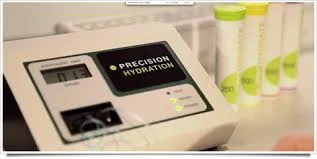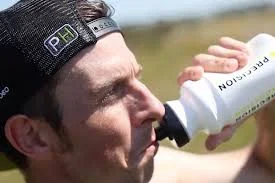IS HYDRATION IMPORTANT FOR ATHLETES IN COOLER CLIMATES?
You may think training and racing in cooler temperatures like the UK gives you a pass card for having to worry about a hydration plan. This is one of the many myths that could be compromising your training and race day performance. In preparation for their visit to us in Bath, we caught up with Jonny from Precision Hydration who was happy to answer a few questions we had regarding sweating and replenishing what's been lost.
SFE: I only race and train in the UK which doesn’t get very hot, do I still need to worry about hydration?
PH: Hydration might not feel as important in the UK weather but it's still a crucial aspect of your performance in colder weather.
Your sweat rate might be lower than in hotter climates, but the amount of sodium you lose in that sweat is largely genetically determined (rather than being overly influenced by things like diet and acclimation to a new climate). This can vary massively from athlete to athlete, from as little as 200mg of sodium per litre of sweat to as much as 2,000mg/l! And so, even in colder weather, it can still be a challenge to adequately replace what you're losing in your sweat.
Adequately replacing the sodium lost in your sweat helps you maintain your blood plasma volume, which in turn can reduce cardiovascular strain and fatigue. This will help you perform at your best for longer and also help you avoid cramp.
Interestingly, colder weather also presents it's own challenges. You generally need to pee more in cold climates (especially when swimming in colder water) and this flushes out electrolytes and fluids, making dehydration more of a risk. Read this blog for more on this: https://www.precisionhydration.com/blogs/hydration_advice/why-do-you-need-to-pee-a-lot-when-swimming-long-distances-cold-water-immersion-diuersis
A personalised hydration strategy is definitely going to be more beneficial if you're racing in the heat/humidity of Bali but that doesn't mean it's not going to pay dividends in Bath...
SFE: I don’t class myself as a heavy sweater, does this mean I don’t lose very much salt?
PH: It depends! There are two variables to consider when thinking about your net sodium losses during a race; your sweat rate and how much sodium you lose in that sweat. We all tend to have an idea of how sweaty we are, but it's harder to know how much sodium you're losing in each drop. This varies widely from athlete to athlete, from as little as 200mg of sodium per litre of sweat to as much as 2,000mg/l! The average person loses around 950mg of sodium per litre of sweat (which is 2-3x more than traditional sports drinks contain!)
This means that someone with a low sweat rate but very salty sweat could actually be losing more sodium over the course of a race than someone next to them who's sweating buckets but only has a small amount of sodium in their sweat.
How much sodium you lose in your sweat is largely genetically determined rather than being overly influenced by diet and acclimation to a new climate, so you only need one sweat test and you've got an important part of the hydration equation sussed for life!
If you're curious as to why replacing the sodium lost in your sweat is so important to perform at your best, read this blog: https://www.precisionhydration.com/blogs/hydration_advice/115861124-is-sodium-important-for-athletes
SFE: I’m a mid-to-back of the pack athlete, but I enjoy racing, is it still worth considering an individualised hydration plan?
PH: You don't have to be an elite athlete to want to get a PB and enjoy cramp / hydration-issue free racing!
Getting hydration right has been proven to improve performance, with one study (www.agenciasinc.es/en/News/Salt-increases-physical-performance-in-resistance-competitions) showing athletes taking in the right amount of sodium finishing a half Ironman an average of 26 minutes faster than those who didn't - it can be very significant and is an easy variable to address.
Adequately replacing the sodium lost in your sweat helps you maintain your blood plasma volume, which reduces cardiovascular strain and fatigue. This can help you perform at your best for longer.
It can also help you avoid cramp. If you suffer with cramp, struggle in the heat or have symptoms like nausea and headaches towards the end of your races, then a personalised approach to hydration really is well worth considering.



